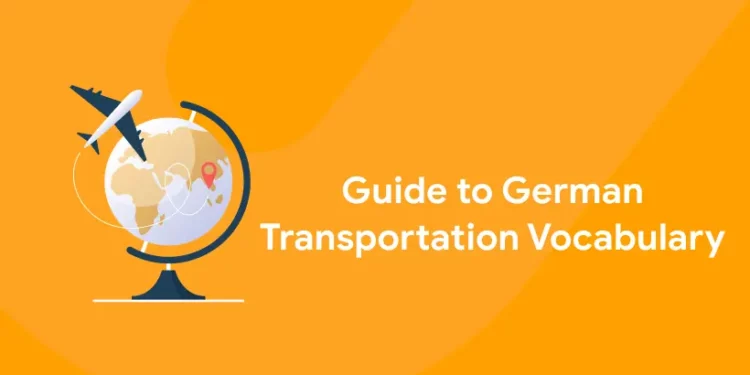Table of Contents
Are you learning German to migrate to Germany for higher studies? Are you assigned a new project by your firm that requires you to shift to a German city? Did you get an internship at a German company? You may have a various reason for travelling to Germany or for learning German. However, German Transportation Vocabulary is one of the simple but essential topics that you have to learn before travelling to Germany.
Want to learn C2 proficiency level German? Join Entri Elevate now!
Guide to German Transportation Vocabulary: Introduction
Travelling is something that is a part of daily life. Hence German Transportation Vocabulary is an essential knowledge when you are traveling to Germany, whether it is just for a trip or if you are attending a university there. Even if you are migrating to Germany, German Transportation Vocabulary is essential when you have to commute to various places there. Even if you are not perfectly fluent in German, having an understanding of basics like this can help you travel and explore Germany. Learning some of these words, phrases or sentences can help you not get stuck in frightening situations like having your phone stolen or your phone not receiving an internet signal hence preventing you from using an internet translator.
Top German Transportation Vocabulary Lists
1: How do you say "Good Morning" in German?
Understanding terms related to transportation is essential for navigating German-speaking areas. Basic German vocabulary for different forms of transportation is provided in this blog. Let us learn the basics of German Transportation Vocabulary.
Vehicle Names in German
Some of the most important vehicle names from German transportation vocabulary are listed below.
| English | German |
| the car | das Auto |
| the truck | der LKW (Lastkraftwagen) |
| the bus | der Bus |
| the boat | das Boot |
| the scooter | der Roller |
| the ship | das Schiff |
| the tram | die Straßenbahn |
| the subway | die U-Bahn |
| the helicopter | der Hubschrauber |
| the motorcycle | das Motorrad |
| the carriage | die Kutsche |
| the train | der Zug |
| the bicycle | das Fahrrad |
| The Airplane | Das Flugzeug |
| Ferry | Die Fähre |
| Moped | das Moped |
| Lorry | der Lastwagen |
| Fire Truck | das Feuerwehrauto |
| Police van | das Polizeifahrzeug |
| Ambulance | der Krankenwagen |
Transportation Location Names in German
While traveling you need to know or ask for where the transportation facilities are available. A few of them are given below.
| English | German |
| the stop/station | die Haltestelle |
| Railway | Die Eisenbahn |
| the train station | der Bahnhof |
| Airport | Der Flughafen |
| Port | Der Hafen |
| Parking lot | Der Parkplatz |
Verbs related to Transportation in German
Learning the verbs in German related to transportation is as important as learning words in the German transportation Vocabulary lists. Let us look into a few of them.
| German | English |
| aussteigen | to get off |
| einsteigen | to get in |
| fahren | to drive |
| fliegen | to fly |
| gehen | to walk |
| laufen | to run |
| umsteigen | to transfer |
| mit der Fähre übersetzen | to go by ferry |
| fliegen | to fly |
| landen | to land |
| bruchlanden | to crash-land |
| abheben | to take-off |
| anspringen | to start |
| zurücksetzen / reversieren | to reverse |
| umdirigieren | to redirect |
| transportieren | to transport |
| lenken | to steer |
| fahren | to drive / ride |
| bremsen | to apply the brakes |
| eine Fahrgemeinschaft bilden | to carpool |
| gegen etwas prallen | to crash into something |
| blinken / den Blinker setzen | to indicate |
| schnell fahren / bretteln | to speed |
| Gas geben | to accelerate |
| die Geschwindigkeit bestimmen | to control the speed |
| befahren | to cruise |
| eine Kreuzfahrt machen | to go on a cruise |
| dicht auffahren | to tailgate |
| ein Auto Probe fahren | to test-drive a car |
| abbiegen | to turn |
| umkehren | to make a U-turn |
Adverbs Related to Transportation
Some German adverbs related to transportation are listed below.
| English | German |
| slow | langsam |
| fast | schnell |
Adjectives Related to Transportation
Some adjectives related to transportation are listed below.
| German | English |
| verkehrsreich | busy |
| frei | permitted |
| verboten | prohibited |
| befahren | used |
| Fahrzeug- | vehicular |
| konvertierbar | convertible |
| selbstfahrend / Automobil- | automotive |
| führerlos | driver-less |
| fahrbereit / verkehrstauglich | roadworthy |
| seetüchtig | seaworthy |
| linksgesteuert | left-hand drive |
| rechtsgesteuert | right-hand drive |
| gepanzert | armored |
| automatisch | automatic |
| manuell | manual |
| elektrisch / Elektro- | electric |
| schwer | heavy |
| öffentlich | public |
| hybrid | hybrid |
| effizient | efficient |
| stark | powerful |
Nouns Related to Transportation
Some nouns related to transportation are listed below.
| German | English |
| die Fahrkarte | the ticket |
| der Fahrgast | the passenger |
| Die Reise | Travel |
| Die Verspätung | Delay |
| Der Fahrplan | Schedule / Timetable |
| Das Gepäck | Luggage |
| die Fahrerin | Female Driver |
| der Fahrer | Male Driver |
| die Fußgängerzone | Pedestrian Zone |
| die Ampel, die Ampeln | Traffic Signal |
| der Zebrastreifen | Zebra Crossing |
| die Straße | Street |
| die Autobahn | Expressway |
| der Fahrradweg | Cycle Way |
| die Anliegerstraße | Service Road |
| der Stau | Traffic Jam |
| der Verkehr | Traffic |
| die Kreuzung | Junction / Cross Road |
| die Garage | Garage |
| die Maut | City Toll |
| die Umleitung | Detour |
| Traffic Policewoman | die Verkehrspolizistin |
| Traffic Policeman | der Verkehrspolizist |
Vehicle Part Names in German
Let us learn some vehicle part names in German so that you can use them in case you need to visit a workshop or ask for help in case a repair is needed.
| English | German |
| Wheel | Das Rad |
| Engine | Der Motor |
| Seat | Der Sitz |
| Brake | Die Bremse |
| Headlight | Der Scheinwerfer |
| to drive | fahren |
| Driver’s license | der Führerschein |
| Fuel/gas | das Benzin |
| Gas tank | der Benzintank |
| Number plate (license plate) | das Kennzeichen |
| to park | parken |
| The bumper | die Stoßstange |
| The car | das Auto |
| The door | die Autotür |
| The driver | der Fahrer / die Fahrerin |
| The engine | der Motor |
| The gas station | die Tankstelle |
| The gears | der Gang |
| The pedal | das Pedal |
| The steering wheel | das Lenkrad |
| Turn signal (blinker) | der Blinker |
| Windscreen | die Windschutzscheibe |
Airport Related Vocabulary
Many words usually used in airports are discussed below.
| German Word | English Word |
| der Flughafen | Airport |
| die Ankunft | Arrival |
| die Bordkarte | Boarding pass |
| abgesagt | Cancelled |
| der Check-in | Check-in |
| die Verbindung | Connection |
| verspätet | Delayed |
| der Abflug | Departure |
| der Flugsteig | Gate |
| die Flugsteignummer | Gate Number |
| das Flugzeugtriebwerk | Jet engine |
| das Gepäck | Luggage |
| pünktlich | On-time |
| das One-Way-Ticket | One-way ticket |
| die Hin- und Rückfahrkarte | Roundtrip ticket |
| die Sitzplatzreservierung | Seat booking |
| die Sicherheitskontrolle | Security check |
| das Terminal | Terminal |
| die Fahrkarte | Ticket |
| die Durchreise | Transit |
| das Flugzeug | Airplane |
| der Gangplatz | Aisle seat |
| einsteigen / an Bord gehen | Board / boarding |
| die Economyclass | Economy class |
| die Besatzung | Crew |
| der Flugbegleiter | Flight attendant |
| das Handgepäck | Hand luggage |
| landen | Land |
| der Reisepass | Passport |
| der Pilot / die Pilotin | Pilot |
| der Fensterplatz | Window seat |
Sentences Related to Transportation
Some example sentences that you can practise to make your conversation regarding transportation are listed below.
| German | English |
| Er hat ein Stoppschild überfahren. | He did not stop at the stop sign. |
| Diesen Montag fährt sie mit dem Bus nach Wien. | This Monday she is taking a bus to Vienna. |
| Bitte im Kreisverkehr die nächste Abfahrt nach rechts nehmen. | Please take the first right turn out of the roundabout. |
| Gehen Sie bitte geradeaus! | Please walk straight. |
| Wie komme ich am schnellsten zum Bahnhof? | Which is the quickest way to the station? |
| Wir haben uns verfahren. | We have lost our way. |
| Parken ist hier verboten. | You are not allowed to park here. |
| Es ist neben dem Bahnhof. | It is next to the train station. |
| Wie gehe ich zum Bahnhof? | How do I go to the station? |
| Wir stecken im Stau. | We are stuck in a traffic jam. |
Some more Sentences
Some more sentences for examples are provided below.
| English | German |
| We need to get off at the next stop. | Wir müssen an der nächsten Haltestelle aussteigen. |
| The train arrives at the main station. | Der Zug kommt am Hauptbahnhof an. |
| The bus comes every ten minutes. | Der Bus kommt alle zehn Minuten. |
| Please get in, the doors are closing. | Bitte einsteigen, die Türen schließen. |
| The passengers are waiting for the train. | Die Fahrgäste warten auf den Zug. |
| Did you buy a ticket? | Haben Sie eine Fahrkarte gekauft? |
| We are walking home. | Wir gehen zu Fuß nach Hause. |
| The stop is right in front of the hotel. | Die Haltestelle ist direkt vor dem Hotel. |
| You can ride a carriage in the city. | In der Stadt kann man mit der Kutsche fahren. |
| The truck transports goods. | Der LKW transportiert Waren. |
| The train is moving very slowly today. | Der Zug fährt heute sehr langsam. |
| The car is driving very fast. | Das Auto fährt sehr schnell. |
| The ship sails across the sea. | Das Schiff segelt über das Meer. |
| The tram stops at the next corner. | Die Straßenbahn hält an der nächsten Ecke. |
| We have to transfer in Cologne. | Wir müssen in Köln umsteigen. |
| The subway is often faster than the bus. | Die U-Bahn ist oft schneller als der Bus. |
| The train departs at 8 o’clock. | Der Zug fährt um 8 Uhr ab. |
Different Types of Tickets in Germany
There are several kinds of tickets available in German transportation. Some of them are listed below.
| German | English |
| der Busfahrschein | Bus ticket |
| das U-Bahn-Ticket | Metro ticket |
| die Einbahnstraße | One-way street |
| das Flugzeugticket | Plane ticket |
| die Rundfahrt | Round trip |
| die Fahrkarte | Ticket |
| der Fahrkartenschalter | Ticket office |
| die Fahrkarte | Train ticket |
| das Straßenbahnticket | Tram ticket |
Ship Related Vocabulary
Some words related to ship transportation are given below.
| German | English |
| der Anker | Anchor |
| das Boot | Boat das boot |
| der Bug | Bow |
| die Kajüte | Cabin |
| das Dock | Dock |
| die Rettungsweste / das Rettungsgerät | Life jacket/life-saving device |
| das Rettungsboot | Lifeboat |
| der Hafen | Port |
| das Segelboot | Sailboat |
| das Meer | Sea |
| das Schiff | Ship |
| das Heck | Stern |
Traffic-Related Words
Some traffic-related vocabulary is also given here.
| German Word | English Word |
| die grüne Ampel | Greenlight |
| die Einbahnstraße | One-way street |
| die rote Ampel | Red light |
| das Tempolimit | Speed limit |
| das Stoppschild | Stop sign |
| die Ampel | Traffic light |
| die Kehrtwende | U-turn |
| die gelbe Ampel | Yellow light |
Tips for Memorizing and Using German Transportation Vocabulary
Some of the tips listed below will help you effectively learn and memorise German Transportation Vocabulary.
- Make Flashcards. Revise words using them.
- Have mock conversations with your peers simulating the circumstances that may happen during travel. For example, buying a ticket, asking for the way to the station, enquiring about train timings, talking to a mechanic etc.
- Ask your mentor to include more conversations related to transportation while teaching the speaking sections.
Free German A1 Mock Tests – Powered by AI!
Test your skills on our interactive platform. Get instant feedback from our AI to help you communicate better and track your progress. Start your free German mock test now.
Test Your German A1 for FreeAdditional Resources for Learning German Vocabulary
Some additional resources that can help you learn German transportation vocabulary are listed below.
- Listen to travel documentaries and vlogs in German language with German subtitles.
- Read travelogues in the German language. They are a good source of German language vocabulary.
- Join an online class and practise with your peers and mentors. Entri Elevate provides local language mentors, live sessions, recorded sessions, Goethe exam training etc. They will take you from A1 to C2 level of proficiency.
Click here to learn more about the German language course offered by Entri Elevate!
Guide to German Transportation Vocabulary: Conclusion
Now that you know these words in German Transportation Vocabulary, you will be more capable of navigating in a German-speaking setting. Keep in mind that mastering these words requires practice. Gaining knowledge of German words related to transportation is a useful first step in enhancing your language abilities, particularly if you intend to visit German-speaking nations. It enables you to successfully convey your travel requirements, traverse cities, and comprehend travel announcements. Keep improving your vocabulary, and don’t be afraid to go back to this guide if you need a reminder.
Free German A1 Mock Tests – Powered by AI!
Test your skills on our interactive platform. Get instant feedback from our AI to help you communicate better and track your progress. Start your free German mock test now.
Test Your German A1 for FreeFrequently Asked Questions
How can I get around linguistic obstacles when using the German public transit system?
Carry phrasebooks or use translation applications like Google Translate. Online courses conducted by expert teachers can also help. Entri Elevate and similar platforms are excellent for perfecting your German.
How can I buy tram and bus tickets in Germany?
Check for ticket machines on buses, trams, and at stations. Find out about “Einzelfahrschein” (single ticket) and “Tageskarte” (day pass). Always use the machines to verify your ticket.
What kinds of trains are there in Germany?
There are several train types in Germany. Intercity Express (ICE), Intercity Express (IC), Regional Express (RE), and Regionalbahn (RB) are among them. You may choose the best train for your journey by being aware of the differences.
Which German terms are necessary for using public transportation?
“Bahnhof,” which means train station, and “Bushaltestelle,” which means bus stop, are important German terms for public transportation. Additionally, “Fahrplan” (timetable), “Fahrkarte” (ticket), and “Straßenbahn” (tram) are crucial. You can read signs and follow directions more easily if you know them.
Why should I study the terminology related to transportation in German?
You may purchase tickets, ask for directions, traverse German-speaking regions, and comprehend travel information by using your transportation vocabulary, which will make your trips easier and more pleasurable.
Do Germans frequently use these transportation terms?
Yes, these are common phrases you’ll come across whether driving, taking public transportation, or talking about your vacation plans in German-speaking nations.











